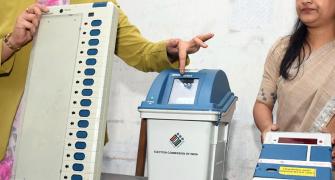Prime Minister Manmohan Singh on Friday mooted a 'specific financing window' for the ambitious Rs 174,000 crore (Rs 1,740 billion) Bharat Nirman Programme aimed at giving a new deal to rural India and bridging the divide to balance growth.
"We are proposing a specific financing window for Bharat Nirman through NABARD to fund selected components," even as most of the resources would come from the government's development outlays, he told the CII-organised conference on Bharat Nirman.
To bridge the rural-urban divide, Singh said he has in mind efforts like e-chaupal, Sagar Hatt, Shakti effort with self-help groups where corporate world is connected with the growth potential in rural India.
The conference, which marks the formal launch of the four-year development initiative, is aimed at building 600,000 houses, adding 10 million hectares of irrigation capacity, connecting 66,802 hamlets with all weather roads, electrifying the remaining 1,00,000 villages, providing safe drinking water in 55,000 villages and ensuring rural telephony in the remaining 55,000 villages.
Though the model of delivery would vary between components, the prime minister proposed to involve panchayats and the private sector as partners in this gigantic task.
"The Planning Commission is working on ways to enhance the management of rural infrastructure programmes by panchayats," he said, adding that state governments and local bodies were critical to effective programme delivery.
State governments are the key implementing agencies, and panchayats need to activate the demand side without which service delivery would not be effective, he said.
Waking up to this vast rural potential, Singh said that global management gurus have talked of the wealth of opportunity available at the 'bottom of the pyramid.'
"Instead of restricting yourself to competing in the existing markets at the 'top of the pyramid' of our society, attention is being drawn to the possibilities of creating new markets at the bottom," he said.
Asserting that the major challenge of economic reform programme is that of balancing the growth process and bridging divides, the prime minister said that Bharat Nirman, a four-year time-bound business plan is aimed at removing this divide by creating rural infrastructure in six areas of irrigation, water supply, housing, roads, telephony and electrification.
By 2009, he said in four of these areas "we would like to see universal coverage where every village in India over a 1,000 population will have an all-weather road, every habitation would have water supply, every village would have a telephone and every village would be electrified."
Concerned over the loss of momentum in recent years in rural electrification, Singh said he was convinced that if reliable power supply was assured, people would be willing to pay for it.
"Energy is an economic resource; every user knows the benefit we derive from safe and reliable source of energy. I am sure consumers will he happy to pay for this energy as indeed, they should," he said.
Though there was endorsement from the captains of Indian industry to this flagship programme launched in the last Budget, Singh said that their concerns were about timely delivery and quality of spending.
Bharat Nirman taken together with National Rural Employment Guarantee Act, National Rural Health Mission and Sarva Shiksha Abhiyan would provide the necessary platform to build rural India's growth potential.
"It should be clear that our government is giving a new deal to rural India. This was our solemn commitment, made from the ramparts of the Red Fort. That we have moved so quickly in delivering on that commitment is a testimony to our sincerity," he said.
"No government in this country has launched such a massive programme for rural development in such a short time," he said, emphasising that Bharat Nirman will go hand in hand with considerable rural asset creation that would happen through the National Rural Employment Guarantee Act.
This new context was a challenge to private sector enterprise to rethink the growth potential of rural India, he said stressing that it was an opportunity for an unprecedented knowledge explosion in villages as they get effectively connected.
The growth of rural India will boost Indian business, and business in turn can fuel rural growth, he said. It is a situation of mutual advantage; private sector initiative and imagination can accelerate the goals of Bharat Nirman, he added.
Singh said agenda of infrastructure development under Bharat Nirman was not new. "What it seeks to do is to impart a sense of urgency to the implementation of these programmes," he added.
Planning Commission deputy chairman Montek Singh Ahluwalia said it was not just an aggregation of old schemes.
"Time frames have been set under the programme and Rural Infrastructure Committee under the prime minister will monitor its implementation," he added.
Listing the six areas on which the programme would focus on, the prime minister said 10 million hectares of additional irrigation capacity would be created.
He said the efforts of the government would be to provide all-weather roads covering habitations with over 1,000 population and all unconnected habitations above 500 population in hilly and tribal areas.
Singh said there was a gap of 15 million houses and we hope to cover a substantial portion of it -- over six million houses through Bharat Nirman in the next four years.
"There are 66,822 villages without a telephone. By September 2007 we hope to provide every Indian village with access to telephone," he said.
Singh said there are still 50,000 habitations without access to safe drinking water and there were 300,000 villages, which have slipped back from full coverage. "The goal under Bharat Nirman is to ensure that ever habitation, not just village, is provided with source of safe drinking water," he said.
The prime minister said the programme would also take electricity to over 1,00,000 villages, which still do not have electricity connection, by 2009.







